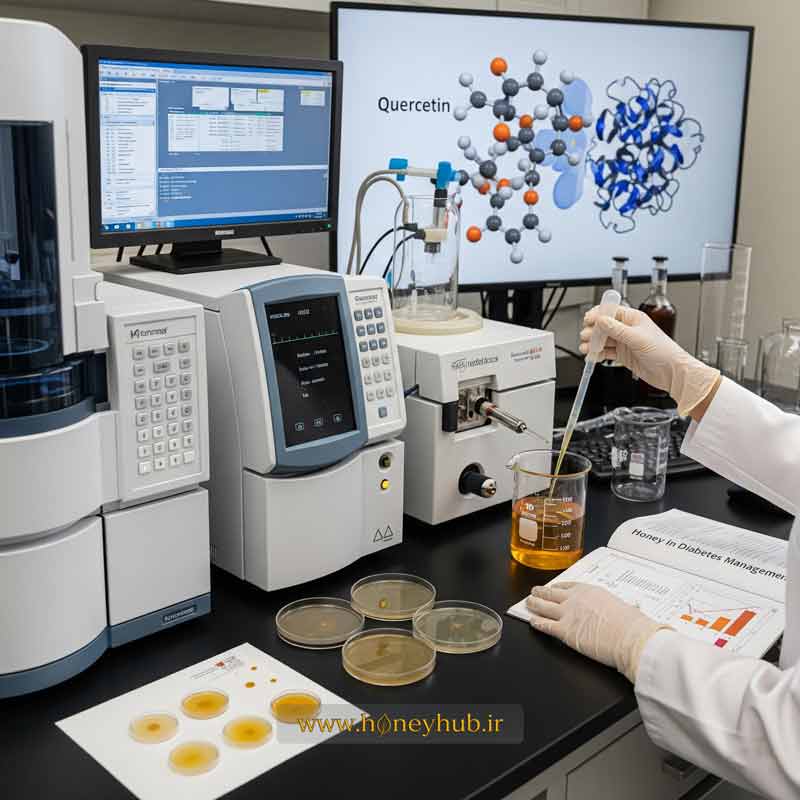Learn to bake the famous Medovik layer by layer. This classic Russian dessert, with its soft honey biscuit and creamy...
Honey vs. Diabetes: A Sweetener or a Smart Therapeutic Agent?
For millions of people living with diabetes, every meal is a precise calculation, and every sweet taste is a moment of hesitation. Amidst this, honey, the liquid gold that has held a place in traditional medicine for thousands of years, is now under modern scrutiny. Should it be blacklisted alongside sugar, or has today's science unveiled secrets that introduce honey not as a simple sugar, but as a Metabolic Modulator? This article is a deep dive into the world of honey and diabetes to answer this critical question. We hope this guide is a meticulous effort to shed light on the ambiguities of diabetes and honey consumption. Please stay with us until the end.

The Complex Composition of Natural Honey
To understand the impact of honey, we must first go beyond its superficial definition as a "sweet substance." Honey is a supersaturated sugar solution composed mainly of fructose (~38%) and glucose (~31%), along with about 17% water. But the real magic of honey lies in the remaining 2%; a complex mixture of over 200 bioactive compounds, as detailed in comprehensive review studies:
- Polyphenols and Flavonoids: These compounds are the backbone of honey's therapeutic properties. Molecules like Quercetin, Kaempferol, chrysin, pinocembrin, and gallic acid possess powerful antioxidant and anti-inflammatory properties that directly counteract the pathophysiology of diabetes.
- Key Enzymes: Enzymes added by bees to the nectar, such as diastase and invertase, not only aid in digestion but also indicate the purity and rawness of the honey. The enzyme glucose oxidase also produces hydrogen peroxide in the presence of water, a mild antimicrobial agent.
- Region-Specific Compounds: Depending on the floral source, unique compounds are found in honey. The most famous example is methylglyoxal (MGO) in Manuka honey, which gives it exceptional antimicrobial activity.
This complex structure is our first answer to the inquisitive reader: No! Honey is not just "sugar and water." It is a "Functional Food" with the potential to influence the body's metabolic pathways in a way that refined sugar never can.
The Diabetes Explosion and the Need to Re-evaluate Solutions
The statistics are alarming. The International Diabetes Federation (IDF) predicts in its latest report that by 2045, over 780 million people worldwide will be living with diabetes. Type 2 diabetes, which accounts for over 90% of cases, is a lifestyle-related disease characterized primarily by insulin resistance. In this condition, the body's cells do not respond properly to the hormone insulin, and sugar accumulates in the blood. In this landscape, the search for natural compounds that can help improve insulin sensitivity is a necessity.
Dissecting the Anti-Diabetic Mechanisms of Honey: A Complex Biochemical Orchestra
The positive effect of honey on diabetes management is not the result of a "magic bullet" or a single mechanism, but rather a complex interaction and synergy among dozens of bioactive compounds that simultaneously target several key pathophysiological pathways in diabetes. Here, we delve deep into these mechanisms based on the latest scientific evidence.
A) Improving Insulin Sensitivity and Cell Signaling
At the cellular level, insulin resistance means that the "locks" of the insulin receptors on the cell surface have "rusted" and do not respond correctly to the insulin "key." Honey's polyphenolic compounds, such as Quercetin, Kaempferol, and caffeic acid, act as "natural insulin sensitizers." They activate the PI3K/Akt signaling pathway, the main highway of insulin messaging, which causes the translocation of glucose transporters (GLUT4) to the surface of muscle and fat cells. This action increases the cell's capacity to absorb glucose from the blood, helping to lower blood sugar levels.
Scientific Source: Hilles, et al. (2020). Honey supplementation in diabetes mellitus: a systematic review. Journal of the American College of Nutrition.
B) Protecting Pancreatic Beta-Cells by Inhibiting Oxidative Stress
The beta-cells of the pancreas are the body's insulin-producing factories. Under hyperglycemic conditions (high blood sugar), these cells are under intense "oxidative stress," which leads to the overproduction of free radicals (ROS). These destructive molecules damage the structure of beta-cells, pushing them towards programmed cell death (apoptosis). Honey, especially darker varieties rich in phenolic antioxidants, creates a protective shield for these beta-cells by neutralizing these free radicals. This cytoprotective effect helps maintain pancreatic function in the long term.
Scientific Source: Ranneh, Y., et al. (2021). Honey and its nutritional and anti-inflammatory effects. International Journal of Molecular Sciences.
C) Modulating the Systemic Inflammatory Response
Type 2 diabetes is an inflammatory disease by nature. Chronic low-grade inflammation is one of the main causes of insulin resistance. The flavonoids in honey can inhibit key inflammatory pathways such as the NF-κB (nuclear factor kappa B) pathway. This pathway controls the production of many pro-inflammatory cytokines (like TNF-α and IL-6). By inhibiting this pathway, honey helps reduce the overall level of inflammation in the body, thereby improving the cells' response to insulin.
Scientific Source: Meo, S. A., et al. (2017). Role of honey in modern medicine. Journal of Ayub Medical College Abbottabad.
D) Slowing Carbohydrate Absorption by Inhibiting Digestive Enzymes
One of the direct and interesting mechanisms of honey is its effect on digestive enzymes. The enzymes alpha-amylase and alpha-glucosidase are responsible for breaking down complex carbohydrates into simple sugars for absorption. Some compounds in honey can inhibit the activity of these two enzymes. This enzymatic inhibition slows down the process of digestion and absorption of carbohydrates and prevents sudden spikes in blood sugar after meals (Postprandial Hyperglycemia). This effect is similar to the action of some oral diabetes medications like acarbose.
Scientific Source: Samarghandian, S., et al. (2017). Honey and Health: A Review of Recent Clinical Research. Pharmacognosy Research.
E) Inhibiting the Formation of Advanced Glycation End-products (AGEs)
Advanced Glycation End-products (AGEs) are harmful molecules created from the non-enzymatic reaction of sugars with proteins and fats in the body. In high blood sugar conditions, the production of AGEs accelerates. The accumulation of these molecules in various tissues (like blood vessels, kidneys, and nerves) causes stiffness, inflammation, and damage, and is responsible for many of the long-term complications of diabetes. The phenolic compounds in honey can prevent the formation of AGEs by trapping intermediate compounds like methylglyoxal, thereby helping to reduce the complications of diabetes.
Scientific Source: Kaka, U., et al. (2021). Honey and its role in the management of chronic diseases. Molecules.
F) Modulating Appetite and Satiety Hormones
Weight management is a crucial part of managing type 2 diabetes. Evidence suggests that honey, compared to common sugars, may elicit a more favorable response in appetite-regulating hormones. Some studies have shown that honey consumption can suppress the secretion of Ghrelin, known as the "hunger hormone," while simultaneously increasing the levels of satiety hormones like Peptide YY (PYY) and Leptin. These hormonal changes can help reduce food cravings and better control calorie intake.
Scientific Source: Larson-Meyer, D. E., et al. (2010). Effect of honey versus sucrose on appetite, plasma glucose, insulin, and ghrelin concentrations in women. Journal of the American College of Nutrition.
G) Modulating the Gut Microbiome and Strengthening the Gut-Pancreas Axis
As mentioned earlier, this is a very active area of research. The oligosaccharides in honey act as a prebiotic, increasing the population of beneficial gut bacteria like Bifidobacterium. These bacteria produce short-chain fatty acids (SCFAs), which not only improve gut health but also stimulate the secretion of the hormone GLP-1, helping the pancreas to secrete insulin optimally and the brain to control appetite.
Scientific Source: Zinatizadeh, M. R., et al. (2021). The effects of honey and its components on the gut microbiota. Ecology and Evolution.
Clinical Evidence: Meta-Analyses and Human Trials
A very recent and comprehensive meta-analysis published in November 2022 in the journal Nutrition Reviews, which included the results of 18 clinical trials, showed that the consumption of honey, especially raw honey, has positive effects on cardiometabolic indicators.
"Cardiometabolic indicators" are measures that show the health of the heart, blood vessels, and metabolism, such as blood sugar and blood fat levels. This major research showed that natural honey is beneficial for controlling these vital indicators.
The following table summarizes these findings and other studies:
| Key Parameter | Effect of Controlled Consumption of Natural Honey | Scientific Source |
|---|---|---|
| Fasting Plasma Glucose (FPG) | ↓ Significant decrease | Nutrition Reviews (2022) |
| LDL Cholesterol (Bad Cholesterol) | ↓ Significant decrease | Nutrition Reviews (2022) |
| Triglycerides (TG) | ↓ Significant decrease | Clinical Nutrition (2019) |
| Inflammation (CRP Level) | ↓ Notable decrease | Phytotherapy Research (2020) |
"The key finding from this research was that consuming about 40 grams (approximately 2 tablespoons) of honey per day for 8 weeks significantly improved fasting glucose and lipid profiles in participants."
Glycemic Index (GI) and Smart Selection of Honey Type
The glycemic index is a measure of how quickly a food raises blood sugar levels. Foods with a low GI (below 55) are preferable for people with diabetes. The GI of honey varies depending on its floral source.
| Honey Name | Approximate Glycemic Index | Key Feature and Probable Mechanism |
|---|---|---|
| Clover Honey | ~ 32 | Very low GI, mild flavor. |
| Thyme Honey | ~ 35 | Low GI, high in antioxidants. |
| Sidr (Jujube) Honey | ~ 43 | Contains compounds that inhibit the alpha-glucosidase enzyme, slowing glucose absorption. (Source) |
| Astragalus Honey | ~ 45 | Strong anti-inflammatory due to the presence of flavonoids. |
| Buckwheat Honey | ~ 51 | Highest level of polyphenols and antioxidant capacity (ORAC). (Source) |
| Manuka Honey (MGO 100+) | ~ 57 | Strong anti-inflammatory and antimicrobial activity. |
Scientific Consumption Protocol: Dose, Timing, and Precautions
To benefit from honey and minimize risks, following a scientific protocol is essential:
- Safe Dosage: Based on existing clinical evidence, a daily dose of 20 to 40 grams (about 1 to 2 tablespoons) has been reported as safe and effective in various studies. It is recommended to start with a lower dose.
- Optimal Timing and Smart Combination: To reduce the glycemic response, never consume honey alone on an empty stomach. Combine it with sources of fiber (like Ceylon cinnamon powder), protein (Greek yogurt), or healthy fats (nuts).
- Absolute Contraindication: Patients with poorly controlled diabetes (HbA1c > 9%) or those who experience severe blood sugar fluctuations should avoid honey until their condition is stabilized.
Conclusion: From Judgment to Smart Use
Scientific evidence clearly shows that natural honey is not a simple sugar. It is a functional food that, when chosen wisely (raw, monofloral, with a low GI) and consumed in a controlled, protocol-driven manner, can become a powerful tool in the diabetes management toolbox through multiple mechanisms. The keywords are, "selection," "control," and "knowledge."
Specialized Frequently Asked Questions (FAQ)
Can honey replace diabetes medications like metformin?
A firm no. This is a dangerous misconception. Honey is an "adjuvant therapy," not a substitute for vital medications. Its role is to improve the overall management of the disease alongside primary treatment.
Why do some studies report an increase in blood sugar after honey consumption? Isn't that a contradiction?
The answer lies in two factors: quality and quantity. These negative studies often used industrial and pasteurized honeys (which are practically sugar syrups) or used very high doses, which contradicts the scientific consumption protocol.
Is honey also useful for type 1 diabetes?
Managing type 1 diabetes is much more sensitive. Honey can be used as part of precise carbohydrate counting to manage hypoglycemia (low blood sugar) or as a sweetener in a balanced meal, but every gram of carbohydrate must be carefully calculated and matched with the insulin dose. Consultation with an endocrinologist is mandatory.
Trust in Science. Choose Quality.
For specialists and informed consumers seeking purity and effectiveness, we at HoneyHub offer a collection of monofloral and lab-tested honeys from Iran. Each product has a defined profile and a quality guarantee so that you can add science and nature to your diet with complete confidence.
View Our Collection of Therapeutic and Specialized Honeys




















Latest comments